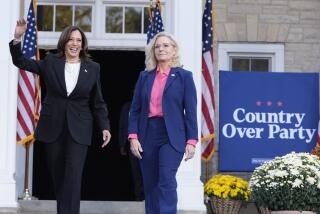Bush Team Divides Diplomatic Duties on Iraq
- Share via
WASHINGTON — President Bush on Thursday skirted the intensifying debate over U.S. intentions toward Iraq, but allowed his vice president to again make the case for military action against Saddam Hussein.
At a fund-raiser in Oklahoma City, Bush declared: “We should not allow the world’s worst leaders to develop the world’s worst weapons.” But he mentioned neither Iraq nor its president by name, seeking instead to suggest that he continues to carefully weigh his options.
“I got a lot of tools at my disposal, and I’m a patient man,” Bush said.
Speaking in San Antonio, Vice President Dick Cheney repeated almost word for word the arguments for swift military action that he first made Monday to a Veterans of Foreign Wars convention in Nashville.
On Thursday, he told Korean War veterans that Hussein has gathered chemical and biological weapons and may acquire a nuclear bomb “very soon.”
“Armed with an arsenal of these weapons, sitting atop 10% of the world’s oil, Saddam Hussein could then be expected to seek domination of the entire Middle East, to take control of the world’s energy supply, and to directly threaten America’s friends,” he said.
Hussein would also “subject the United States, and any other nation, to the threat of nuclear blackmail,” Cheney said.
The contrast in these messages underscores the White House’s division of labor on the issue.
Cheney is spelling out the rationale for war in an effort to influence the intensifying debate over the wisdom of an attack. Bush, saying less and steering clear of most details, can deflect criticism from abroad by saying he has not yet chosen a course.
The president’s remarks came in a fund-raising and get-out-the-vote trip conducted after four days out of the public eye at his ranch near Crawford, Texas.
Bush said U.S. efforts overseas since Sept. 11 could have positive effects.
“I understand that history gives us an opportunity to make the world more peaceful.... See, out of the evil done to America is going to come some incredible good,” Bush said.
He continued: “And you need to tell your little ones that part of that good is a more peaceful world, that there’s going to be some steep hills to climb between now and then. But by being tough and strong, patient, smart and wise about using our assets and all the tools at our disposal, that we can make the world more peaceful for generations to come.”
Cheney contended that U.S. action in the Middle East could create new stability in the region, but he gave greater stress to the dangers that the Bush administration says are now posed by Hussein’s regime.
The vice president said Hussein’s unconventional weapons have not been amassed to defend Iraq.
“They are offensive weapons, for the purpose of inflicting death on a massive scale, developed so that Saddam Hussein can hold the threat over anyone he chooses in his own region or beyond,” he said.
Cheney sought to cast doubt on the value of more weapons inspections by the United Nations, saying that Hussein had proved a master of deceit and had repeatedly concealed the signs of his chemical, biological and nuclear programs.
The vice president insisted that Bush would take heed of Congress’ views. Bush “wants us to participate fully” in upcoming hearings on the issue, he said.
Cheney’s remarks on Monday set off a new round of criticism abroad about the administration’s plans concerning Iraq.
On Thursday, French President Jacques Chirac said in Paris that the possibility of a unilateral action by the United States was “worrying” and “contrary to the cooperation of states, the respect of law and the authority of the [U.N.] Security Council.”
Officials in Turkey, an important U.S. ally, also expressed doubts about an American attack on Iraq during meetings in Washington this week.
Turkey is proposing tighter trade sanctions, fearing a Kurdish state could emerge in Iraq’s north if Bush uses force. The Turks have fought the separatist activities of their large Kurdish minority for years, as have the Iraqis theirs.
Turkey’s views were conveyed in two days of talks in Washington between Ugur Ziyal, undersecretary for foreign affairs, and high-level Bush administration officials.
Secretary of State Colin L. Powell spoke with German, British and Spanish foreign ministers on Wednesday and Thursday, spokesman Richard Boucher said.
Powell was “taking up the fact that Iraq’s defiance of the Security Council and development of weapons of mass destruction constitutes a danger that we have to deal with, and discussing with these countries how to deal with that,” Boucher said.
The Iraqi government said Thursday that it was ready to negotiate.
“There’s still room for diplomatic solutions to avert a war with the United States,” said Iraqi Vice President Taha Yassin Ramadan, who met with Syrian officials in Damascus..
*
Richter reported from Washington and Gerstenzang from Little Rock, Ark.
More to Read
Get the L.A. Times Politics newsletter
Deeply reported insights into legislation, politics and policy from Sacramento, Washington and beyond. In your inbox three times per week.
You may occasionally receive promotional content from the Los Angeles Times.











